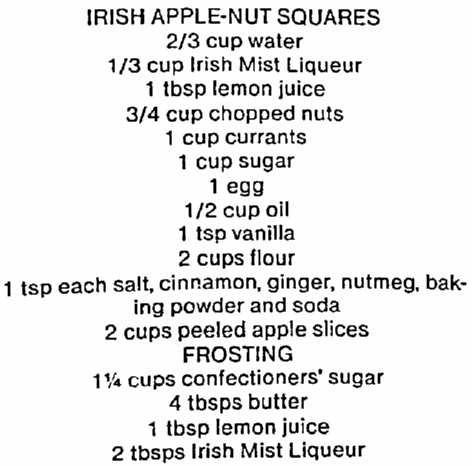Introduction: Gena Philibert-Ortega is a genealogist and author of the book “From the Family Kitchen.” In this blog article – in honor of tomorrow’s celebration of St. Patrick’s Day – Gena searches newspapers to find recipes, both historical and modern, for dishes to serve at your St. Patrick’s Day feast.
There are certain times of the year that your family may have a special menu that is served – a meal reserved for that one special day. Maybe it’s a holiday or a family celebration that brings everyone together to eat that much-anticipated feast.
We have no Irish roots in my family, but growing up I could always count on corned beef with cabbage, carrots, and potatoes on March 17th. Aside from Thanksgiving, it was one of the few days of the year that the menu was set in stone. I did some research in GenealogyBank’s Historical Newspaper Archives and, judging from the newspaper articles I found, most American families share this spring-time tradition of a St. Patrick’s Day feast.
Corned Beef: An Irish Meal?
Probably not surprisingly, the menu we most associate with the Irish may actually be distinctively American. In 1984, food writer Tom Hoge remarked that he didn’t see corned beef and cabbage featured at any Dublin restaurants he visited, though he heard that cold corned beef was a Christmas Eve dish.
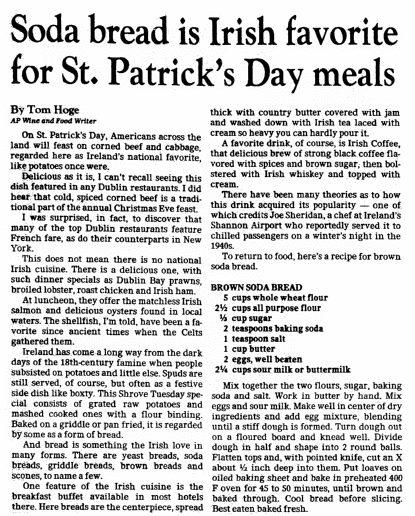
What Irish cuisine did he come across in Ireland? “Dublin Bay prawns, broiled lobster, roast chicken and Irish ham.” This recipe accompanying his article is for a more traditional Irish food: Brown Soda Bread.
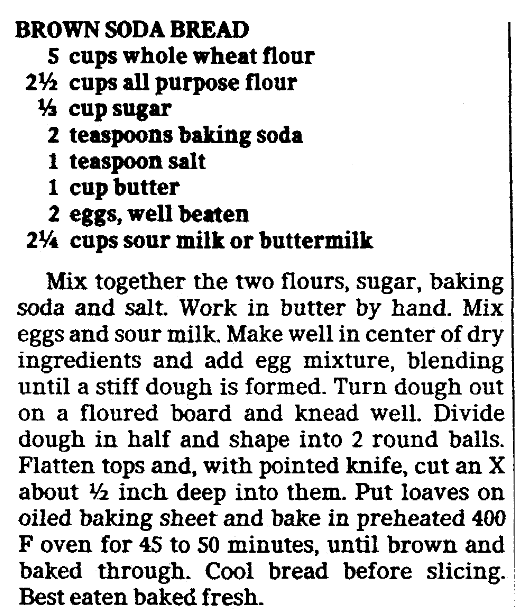
I’ve been told by others who have visited Ireland that corned beef and cabbage is absent from restaurant menus. There’s probably a good reason for that. Historically the Irish did not eat beef – they ate pork. Beef was introduced to them by the British in the 1600s. The Irish started producing and exporting their salted beef to Britain and its colonies where demand was high. This demand fizzled in the 1800s when the colonies were able to provide their own beef. During the 19th century, Irish immigrants in New York starting eating corned beef from local Jewish butchers.* So it turns out that the popular association of corned beef and cabbage with the Irish does have a historical basis – but it’s not so much a food that the Irish ate as it is a food with British ties.
Add a Shamrock to Make Something Irish
Proving that anything decorated with a shamrock or leprechaun – or colored with green food dye – is appropriate for a St. Patrick’s Day meal, this “old-time favorite” recipe from a 1952 newspaper features canned peaches and cottage cheese all dressed up.
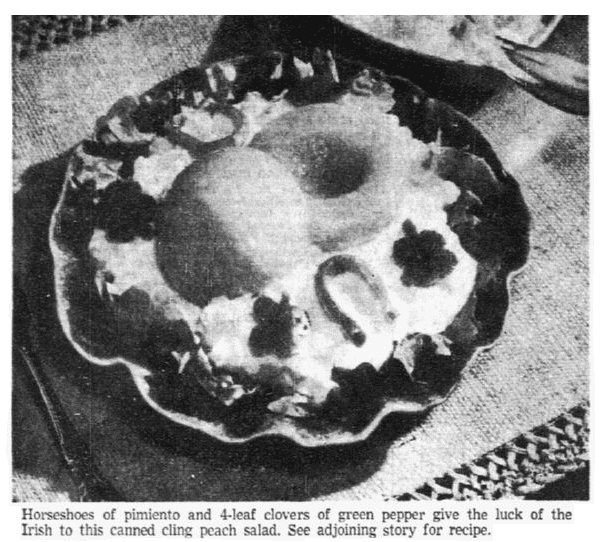
Here is that recipe.
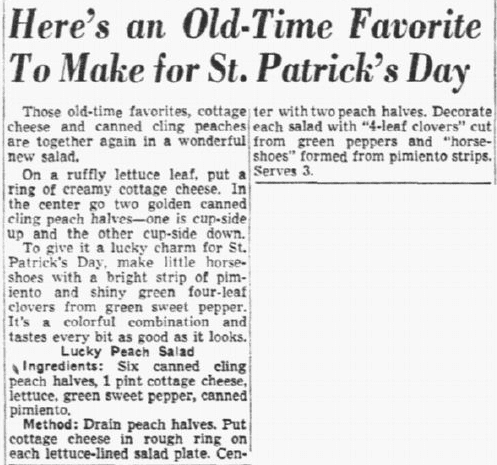
St. Patrick’s Day Party Menu
You might decide to do more than add green food coloring to your meal for a St. Patrick’s Day party. I love the idea for a potato party found in this 1918 newspaper article.
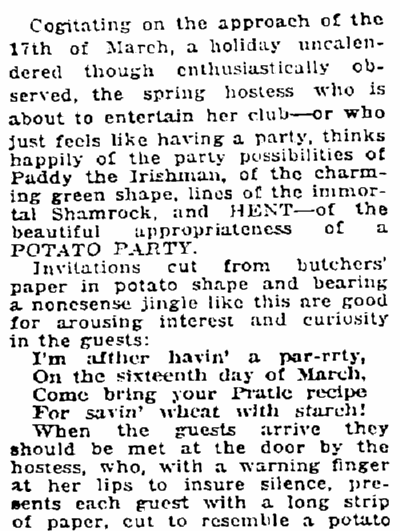
Aside from the food at this party, which of course includes various green produce, there are Ireland-inspired activities. One such activity recreates kissing the famous Blarney stone:
When the guests have removed their wraps have a friend or a maid direct them to the attic or an upstairs room and there ask each to climb a ladder and kiss a large stone, real or make believe – conspicuously marked ‘Blarney.’ After that each guest is expected to exert herself to keep a civil tongue in her head and speak with soft and flattering words.
The menu for the potato party includes Cream of Potato Soup with Parsley “Emerald Isles,” Olives, Irish Stew, Potato Bread Toasted Cheese Sandwiches, Emerald Salad, Wafers, St. Patrick’s Pudding, Coffee, and Mints. The recipe for the soup is not provided because it “is known to every housewife,” but the Emerald Salad recipe is printed and is a mixture of canned French peas and chopped green pepper tossed with mayonnaise and served on a lettuce leaf with a garnish of cheese rolled in pistachios.
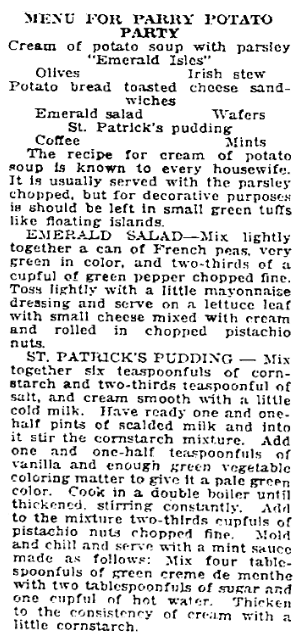
Dessert
How about something to drink or a dessert for the end of your St. Patrick’s Day feast?
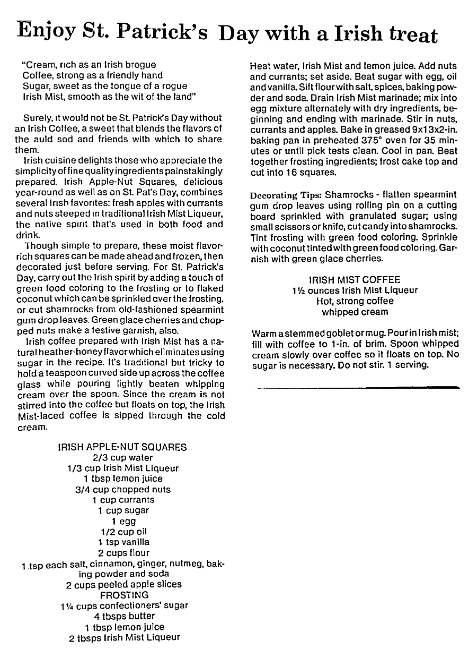
This article begins with this beguiling introduction:
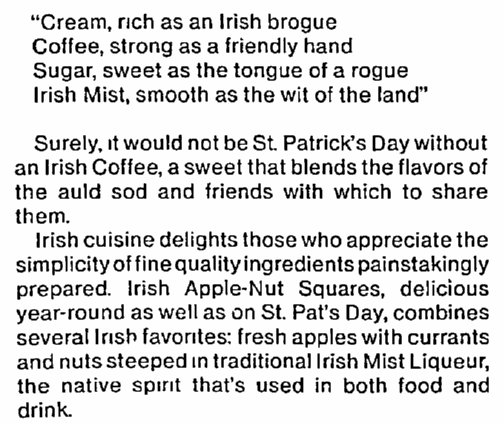
Here is the recipe for Irish Apple-Nut Squares.
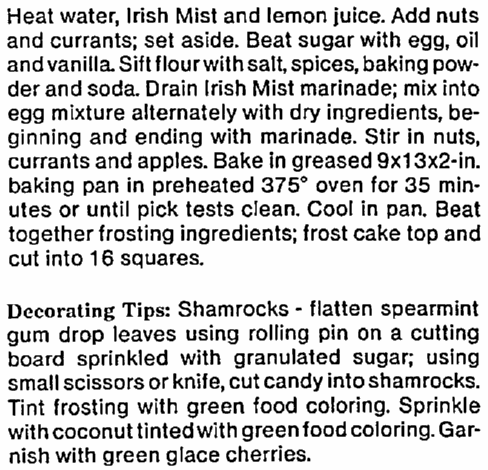
Here is the recipe for Irish Mist Coffee.
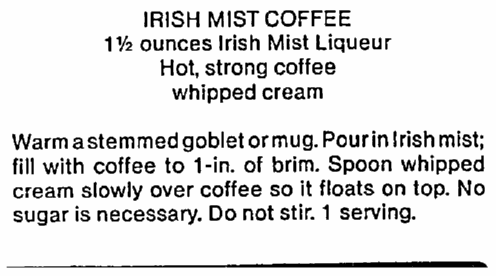
And if you can’t resist something topped with green frosting you could make these non-traditional cupcakes for your St. Patrick’s Day feast.
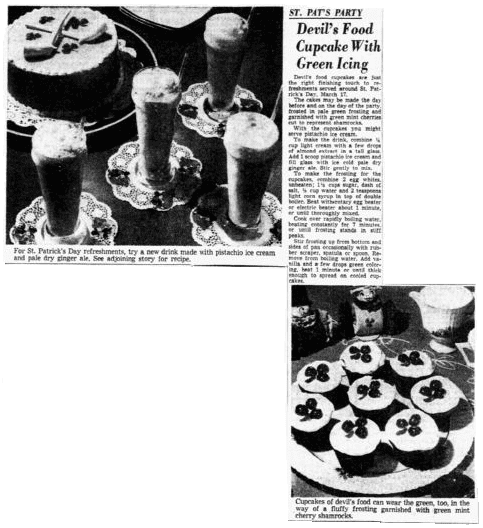
Here is the recipe to make that green frosting for your devil’s food cupcakes.
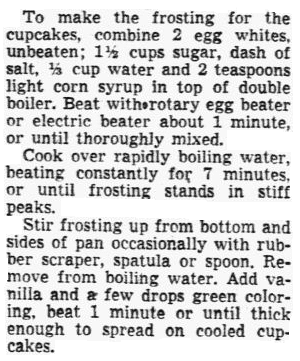
So Where Is the Corned Beef?
If you’re like me, this year’s St. Patrick’s Day feast will once again include corned beef and cabbage. My recipe is pretty simple. I’ll add corned beef, potatoes, and carrots to my slow cooker with a bit of water. About an hour or so before dinner I’ll add some cabbage. And of course I’ll have plenty of yellow mustard for those so inclined to slather everything with it.
Looking for other recipes for your corned beef meal? Here’s an 1872 recipe that provides the advice you need to make tender corned beef and cabbage without that “disagreeable odor.”
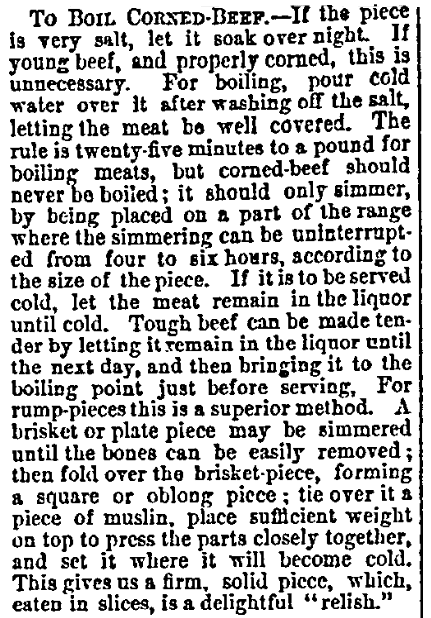
Here’s a more modern recipe for corned beef with cabbage and potatoes.
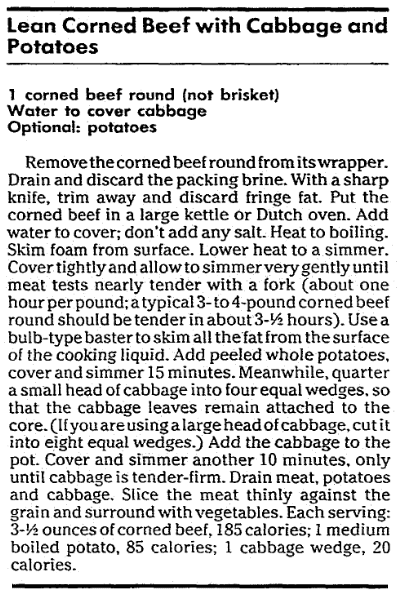
No matter what you’ll be dining on tomorrow for your special feast, Happy St. Patrick’s Day to you and your family!
———————————
* Is Corned Beef Really Irish? The rise and fall and rise of the traditional St. Patrick’s Day meal. Smithsonian.com http://www.smithsonianmag.com/arts-culture/is-corned-beef-really-irish-2839144/?no-ist
Related Irish American Genealogy Articles:

